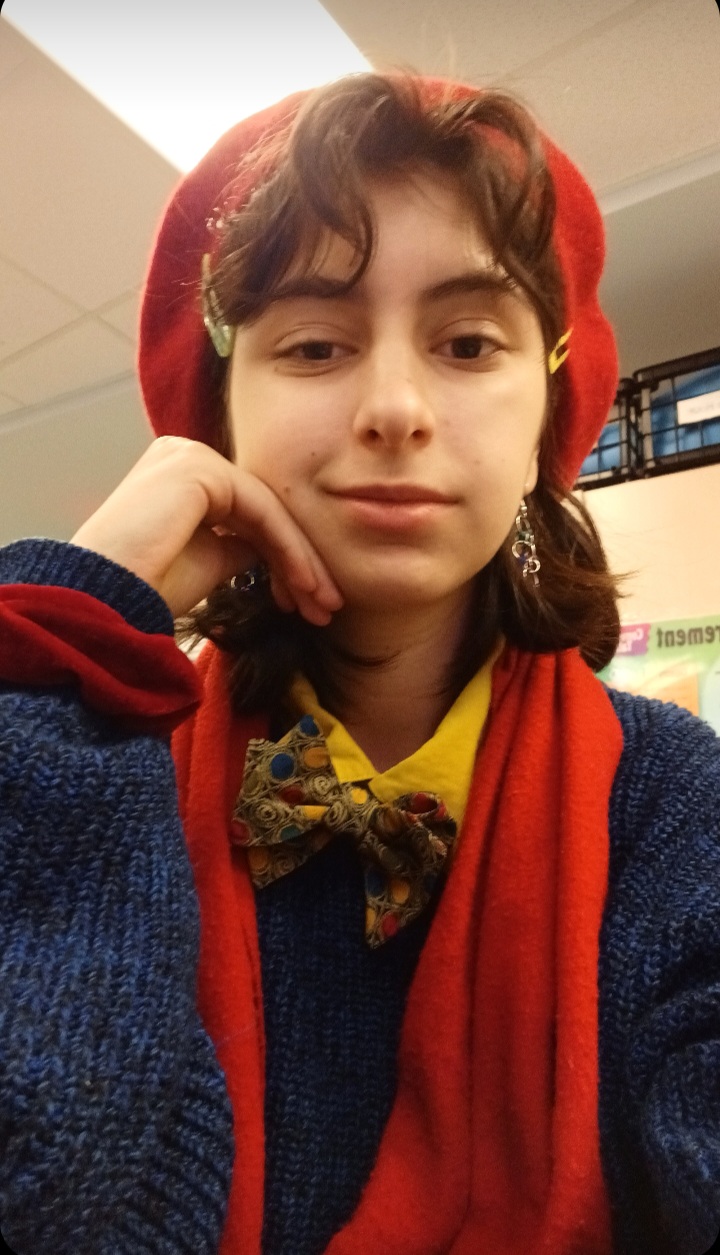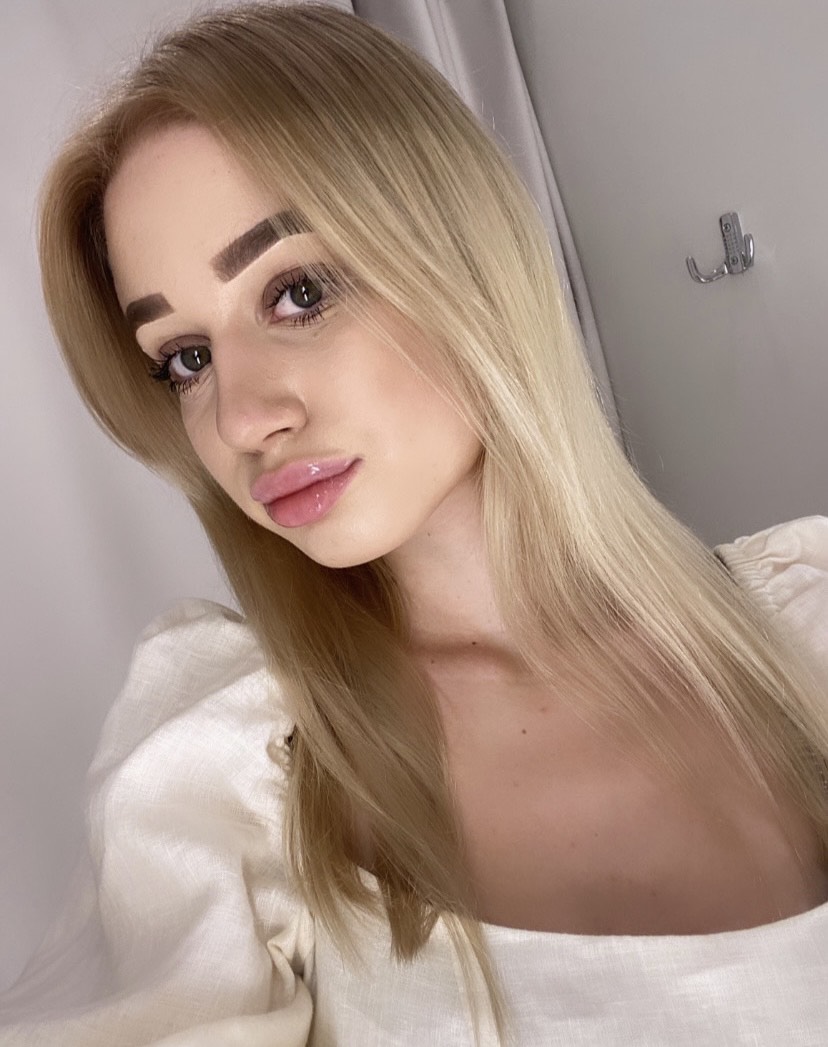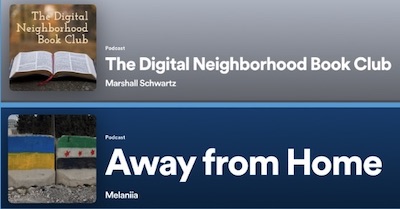This past spring, Huron English teacher Letitia Simmons—in cooperation with the Huron librarians and their student intern—developed a Speaking and Listening unit for Contemporary Literature students to create a 5-minute podcast for the New York Times student podcast contest.
Out of 1,100 entries, two Huron podcasts representing three Huron students were recognized.
One of the 11 winners was “Away From Home” by Melaniia Cherepanyna, 19, and Sham [Almohamad Alalem], 18.

One of 14 runners-up was “The Digital Neighborhood Book Club” by Marshall Schwartz, 17, a Huron rising senior.

Melaniia and Sham are refugees from Ukraine and Syria, respectively.
An AAPS student for two years while her mother finished her Ph.D. at the University of Michigan, Melaniia graduated from Huron this spring and has returned to Kyiv, Ukraine. She would like to return to the US for college in the fall, though she is also applying to colleges in Europe.
Sham has been enrolled in AAPS for one year and will return to Huron High School as a senior in the fall.
“Both of their personal stories are incredible,” said Jennifer Colby, teacher librarian at Huron High School, who applauds Simmons for encouraging and supporting student voices. “I appreciate the sly humor and friendly tone of Marshall’s podcast. Marshall highlights many very interesting points in a short amount of time encouraging the listener to remain engaged even if they have only seen the movie and not read the book, “The Princess Bride.”
Simmons said she wanted her students to create podcasts because she wanted them to use/find their passion for something that they were interested in and use their voices in a 21st-century way.
“I wanted them to enter the contest because I wanted them to have the chance to have their voices heard; the original plan was to have them create and put on Spotify, which would have given them the opportunity for a real audience, but without the guaranteed ears to listen. As with all my ideas, I was discussing this at lunch in the English department when (Huron ELA teacher) Kris Zager suggested the contest. The timing worked out for the unit and here we are!
Students used their Chromebooks, while Simmons borrowed some headphones from another teacher for the students who didn’t have headphones as she learned this makes for better sound quality when recording.
“There were tips on editing on the contest website and other sites, and the library intern, Emily, was really my tech guru,” said Simmons. “It is pretty easy these days—sort of intuitive—but there were some editing snafus for a few students. We used the offices throughout the English department so students could record and we just kind of figured it out! I began the unit telling them all that I was modeling risk-taking behavior; that this was something I had wanted to do and I hoped they would trust me; that we would learn together and we sure did!”
Simmons had three sections of about 65 students in Contemporary Lit and all but four of them submitted to the contest. The ones who didn’t submit podcasts had recording issues or were over the time limit and didn’t get their podcast edited in time.
“I knew the minute I heard “Away from Home” that it was special and was sure to get the attention of the contest; I mean, how could it not?” Simmons asked. “It was edited well, it was honest and from the heart and it is timely. When I first listened to it, I just sat at my desk and cried. So very powerful. Marshall’s podcast, “The Digital Neighborhood Book Club ” was also a standout; I loved their editing and the pitch of their voice, and I love “The Princess Bride.”
“I am so very proud of all the students for their risk-taking. It is such a great lesson when it pays off with this type of recognition.”
This is the website created for the assignment.
Marshall Schwartz: The Digital Neighborhood Book Club

Why did you want to make this podcast?
When I got the assignment, I knew I wanted to do my podcast on something I was passionate about, and I knew that a book review format was something I would find fun- so it only seemed natural to make it about my favorite book.
What technology did you use?
I used Spotify For Podcasters to do all my recording, editing, and sound effects.
What did you learn in the process?
During the process, I learned that editing is a whole lot more time-consuming than writing. Haha!
Do you have a favorite podcast?
I don’t listen to a lot of podcasts, but my absolute favorite is The Magnus Archives by Rusty Quill.
Will you continue to make podcasts?
I’m not sure if I’ll continue making podcasts. I’m a writer, so it’s not entirely out of the question. I think the subject has to really strike me- and I’m still very passionate about my books, so maybe I will continue making something similar someday.
Melaniia Cherepanyna: Away from Home

Why did you want to make this podcast?
The creation of the podcast was an assignment in our English class and everyone had to make one about any topic of their choice and then submit it to the annual New York Times Podcast Contest. As soon as we heard about this, Sham and I knew that we would be making our podcast together and that it would be about war and our experiences with it. Since Sham is from Syria and I am from Ukraine, both of our lives were affected by war and both of these wars are also connected to each other in many ways. We thought that it would be very interesting to share our opinions because we both come from different backgrounds but war is something that connects us and makes us relate to each other. Since the beginning of our friendship, we found many similarities between our stories and so when we had to make a podcast we sat down and talked about them. Because of Sham, I was able to learn so much about the Syrian civil war that I didn’t know before and it was a very interesting discovery. She also was able to learn a lot from me about the war in Ukraine and the historical events that led to it.
What message did you most want to get across in this podcast?
The main message that me and Sham want to deliver to our listeners is “People shouldn’t live only in their own bubble and comfort zone. The world is unfortunately highly unfair and there are people in many countries that are suffering because of the horrible consequences of war. Some simply have the privilege to never experience it and not to care. We want to ask everyone who is listening to our podcast to please care and educate themselves about what is going on in the world, and most importantly why is it happening. Be on the right side of history and help as much as you can if you are able. Help refugees and help those who are fighting for democratic values.
Does your opposition to Russia automatically make you feel connected to Sham?
Definitely. Both of our countries are victims of Russian aggression and it is so important to talk about it. Russia terrorized, invaded, and bombed many many countries including Syria and Ukraine. The first thing that I and Sham realized we have in common is that Russia caused wars in both of our countries. We briefly mentioned it in our podcast, but both the Ukrainian army and the Syrian opposition are fighting for the same values such as democracy and freedom of speech. Values that America is known for in the world. So it is especially important for Americans to understand why the Syrian civil war and the war in Ukraine are connected to each other and that both Syrians and Ukrainians are dying and suffering because of Russia.
You say you want to help others rather than sit back and be depressed about war. What are you doing?
Since the beginning of the war in Ukraine, I have been trying to do as much as possible to help my country. Me and my family have donated to the Armed Forces of Ukraine many times as well as to the refugees that have lost everything they had because of the war. I have also been spreading awareness a lot about what is happening in Ukraine to make foreigners understand this war better and to encourage them to help as well. I personally have made many posters, went on protests and demonstrations, written an article for my school’s newspaper, and participated in some other podcasts as well where I was being interviewed regarding the war in my country. When I learned more about the civil war in Syria, I have been spreading awareness about it as well, especially to my Ukrainian friends who might have not known a lot of the details of it.
How have these wars changed you as a person?
Personally, for me, it has definitely affected and changed a lot of aspects of my life. The full-scale invasion of Ukraine in 2022 happened very suddenly and it was a big shock for me and my family. We saw a lot of horrible violence done by the Russian soldiers such as execution of civilians, mass killings, mass rape, deportation of Ukrainian children, and complete destruction of the cities. My hometown Kyiv was also bombed many times and it has completely changed the routine in which we live. I was in the United States when the full-scale invasion started and I was constantly getting messages from my loved ones about how they keep hearing explosions and air sirens. Currently, I am in Ukraine, in Kyiv, and also hear them every day. It has changed my perception of reality and my values. You start to realize that all of the other little problems in your life are nothing compared to such a big tragedy.
Sham Alalem: Away from Home
Why did you want to make this podcast?
I wanted to make this podcast because I wanted to talk about what is happening in Syria and in Ukraine as well. This podcast was an assignment in our literature class and we had to choose a topic. I chose this topic because it is very important to me and for so many other people that have experienced the war.
What did you want listeners to take away from it?
I wanted all of the people around the world to know what is happening in Ukraine and Syria and I wanted them to know that thousands of people are suffering. I also wanted people to help others because there are a lot of people that still don’t know what is happening in every country that is going through a war.

Does your opposition to Russia automatically make you feel connected to Melaniia?
We definitely feel connected especially since Russia is our enemy. Because we both know that Russia is the reason why we’re refugees now. And both our countries are victims. Since I met Melaniia, I knew that we will both enjoy talking about politics together and telling each other about our experiences and the amount of hate we have for Russia. This made me feel very connected to my friend and it helped me realize that I am not the only one struggling.
How have these wars changed you as a person?
instead of sitting and crying it is important for me to post more about what is happening in Syria and to write more about the innocent people, and to tell people more about the Syrian Civil War. I help by posting and donating. I also try to help my family that still lives in Syria. the war has changed me in so many ways. After immigrating to Lebanon and then America, I started knowing more about what is it like to be a refugee. The war has affected me in some good and bad ways. Because of war, I was able to learn English and study in America. However, I lost my memories, friends, and so many things I used to love. But the war also helped me become mature, understanding, and confident to be able to face the world and talk about everything that is happening.












